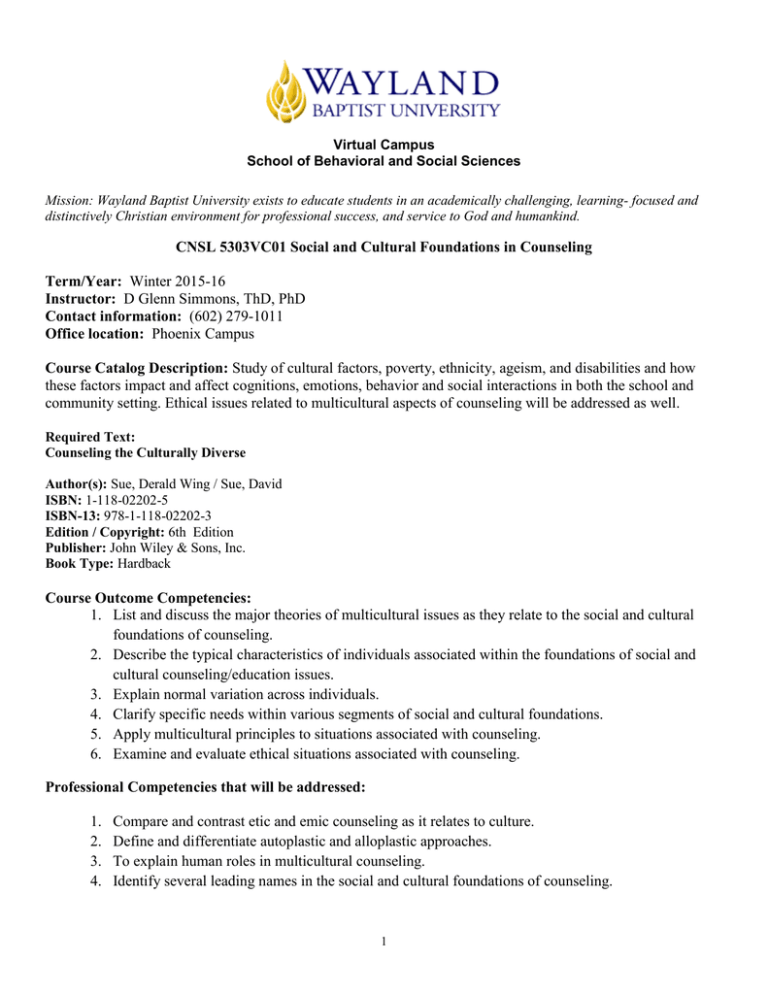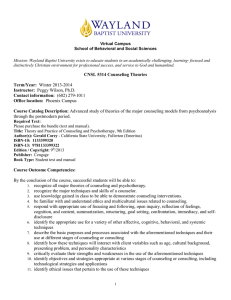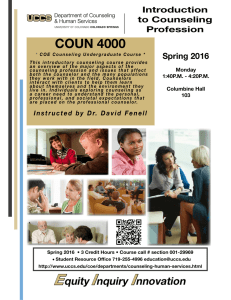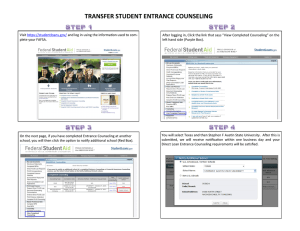Virtual Campus School of Behavioral and Social Sciences
advertisement

Virtual Campus School of Behavioral and Social Sciences Mission: Wayland Baptist University exists to educate students in an academically challenging, learning- focused and distinctively Christian environment for professional success, and service to God and humankind. CNSL 5303VC01 Social and Cultural Foundations in Counseling Term/Year: Winter 2015-16 Instructor: D Glenn Simmons, ThD, PhD Contact information: (602) 279-1011 Office location: Phoenix Campus Course Catalog Description: Study of cultural factors, poverty, ethnicity, ageism, and disabilities and how these factors impact and affect cognitions, emotions, behavior and social interactions in both the school and community setting. Ethical issues related to multicultural aspects of counseling will be addressed as well. Required Text: Counseling the Culturally Diverse Author(s): Sue, Derald Wing / Sue, David ISBN: 1-118-02202-5 ISBN-13: 978-1-118-02202-3 Edition / Copyright: 6th Edition Publisher: John Wiley & Sons, Inc. Book Type: Hardback Course Outcome Competencies: 1. List and discuss the major theories of multicultural issues as they relate to the social and cultural foundations of counseling. 2. Describe the typical characteristics of individuals associated within the foundations of social and cultural counseling/education issues. 3. Explain normal variation across individuals. 4. Clarify specific needs within various segments of social and cultural foundations. 5. Apply multicultural principles to situations associated with counseling. 6. Examine and evaluate ethical situations associated with counseling. Professional Competencies that will be addressed: 1. 2. 3. 4. Compare and contrast etic and emic counseling as it relates to culture. Define and differentiate autoplastic and alloplastic approaches. To explain human roles in multicultural counseling. Identify several leading names in the social and cultural foundations of counseling. 1 Week Due Date Chapters Subject/Assignments 1 11/14/2015 1,2,3 Part 1: The affective and Conceptual Dimensions of Multicultural Counseling/Therapy Discussion Board 1; Quiz 1; Wiki; Email, Map; Messages 2 11/21/2015 4-5 Part II: The Political Dimensions of Mental Health Practices Quiz 2; Discussion Board 2 3 12/5/2015 6-7 Part II continued Part III: The Practice Dimensions of Multicultural Counseling Quiz 3; Discussion Board 3 4 12/12/2015 8-9 Part III continued Quiz 4; Discussion Board 4; Observation 5 12/19/2015 10-11 Part III continued Part IV: The Racial/Cultural Identity Development in Multicultural Counseling and Therapy Quiz 5; Discussion Board 5 6 1/9/2016 12-13 Part V: Understanding Specific Populations Quiz 6; Discussion Board 6; Wiki 7 1/16/2016 None Discussion Board 7; Research Paper 8 1/23/2016 22-24 Part V continued (counseling LGBT; counseling older clients; and counseling women) Quiz 7; Discussion Board 8 9 1/30/2015 25-26 Part V continued (Counseling and Poverty, Counseling persons with disabilities) Quiz 8; Discussion Board 9 10 2/6/2015 None Final Exam 11 All work due by 2/9/2016 No Reading No Assignments 2 COURSE GRADING CRITERIA: This course consists of many assignments. In order to avoid falling behind, all assigned work must be submitted when due. Late work will not be accepted. Assignments Quizzes (weekly) Discussions Observation Wiki Research Paper Final Exam TOTAL POINTS Possible 160 250 100 90 250 150 1000 Earned Point Conversion Table A = 900 -1000 points B = 800 - 899 points C = 700 - 799 points D = 600 - 699 points F = 599 points or below ASSIGNMENTS: Keep pace with the requirements of this course including due dates for assignments, and all other course work. Late work is not accepted. All assignments are due by midnight Saturday each week, with the exception of the final which is due on Wednesday. Please review all the documents in “Course Materials”. Here you will find assignments, instructions, rubrics etc. ATTENDANCE: This is an on-line class. Please see syllabus for weekly assignments, and due dates. SERVICE FOR THE DISABLED: “In compliance with the Americans with Disabilities Act of 1990 (ADA), it is the policy of Wayland Baptist University that no otherwise qualified person with a disability be excluded from participation in, be denied the benefits of, or be subject to discrimination under any educational program or activity in the university. The Coordinator of Counseling Services serves as the coordinator of students with a disability and should be contacted concerning accommodation requests at (806) 291-3765. Documentation of a disability must accompany any request for accommodations.” ACADEMIC HONESTY: Wayland "expects students to be honest in all of their academic work. By enrolling, students agree to adhere to the highest standards of academic honesty and integrity and understand that failure to comply with this pledge may result in academic and disciplinary action." Plagiarism “Plagiarism — The attempt to represent the work of another, as it may relate to written or oral works, computerbased work, mode of creative expression (i.e. music, media or the visual arts), as the product of one's own thought, whether the other's work is published or unpublished, or simply the work of a fellow student. When a student submits oral or written work for credit that includes the words, ideas, or data of others, the source of that information must be acknowledged through complete, accurate, and specific references, and, if verbatim statements are included, through use of quotation marks as well. By placing one’s name on work submitted for credit, the student certifies the originality of all work not otherwise identified by appropriate acknowledgements. A student will avoid being charged with plagiarism if there is an acknowledgement of indebtedness. Examples include: 1. Quoting another person's actual words. 3 2. Using another person's idea, opinion, or theory, even if it is completely paraphrased in one's own words. 3. Drawing upon facts, statistics, or other illustrative materials — unless the information is common knowledge. 4. submitting a paper purchased from a term paper service as one's own work. 5. Failing to accurately document information or wording obtained on the World Wide Web. 6. Submitting anyone else's paper as one's own work. 7. Violating federal copyright laws, including unauthorized duplication and/or distribution of copyrighted material. 8. Offering, giving, receiving or soliciting of any materials, items or services of value to gain academic advantages for yourself or another.” Source: http://www.spjc.cc.fl.us/webcentral/admit/honesty.htm#plag Disciplinary action for academic misconduct is the responsibility of the faculty members assigned to the course. The faculty member is charged with assessing the gravity of any case of academic dishonesty, and with giving sanctions to any student involved. Penalties may be applied to individual cases of academic dishonesty see catalog for more information about academic dishonesty. rev 9/11/2014 4





